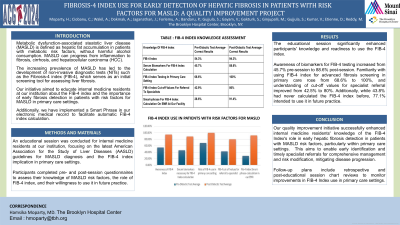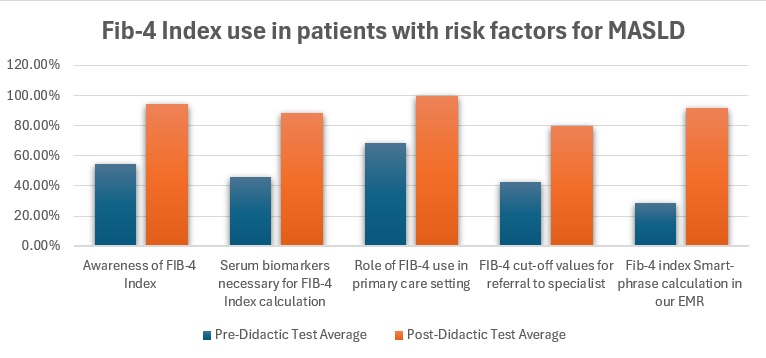Sunday Poster Session
Category: Liver
P1156 - Fibrosis-4 Index Use for Early Detection of Hepatic Fibrosis in Patients With Risk Factors for MASLD: A Quality Improvement Project
Sunday, October 27, 2024
3:30 PM - 7:00 PM ET
Location: Exhibit Hall E

Has Audio

Hamsika Moparty, MD
The Brooklyn Hospital Center
Brooklyn, NY
Presenting Author(s)
Hamsika Moparty, MD1, Camelia Ciobanu, MD2, Ali Wakil, MD2, Amr Dokmak, MD2, Jeeva Jaganathan, MD2, Arnold N. Forlemu, MD, MPH3, Praneeth Bandaru, MBBS, MD2, Srilaxmi Gujjula, MD1, Vijay Bhaskar Reddy Gayam, MD4, Suut Gokturk, MD1, Manasa Ginjupalli, MBBS, MD5, Saigopal R. Gujjula, MD2, Vikash Kumar, MD6, Denzil Etienne, MD2, Madhavi Reddy, MD, FACG2
1The Brooklyn Hospital Center, Brooklyn, NY; 2Brooklyn Hospital Center, Brooklyn, NY; 3Brooklyn Hospital Center, Athens, GA; 4University of Texas Southwestern, Dallas, TX; 5The Brooklyn Hospital Center, New York, NY; 6Creighton University School of Medicine, Brooklyn, NY
Introduction: Metabolic dysfunction-associated steatotic liver disease (MASLD) is defined as hepatic fat accumulation in patients with metabolic risk factors, without harmful alcohol consumption. MASLD can progress from inflammation to fibrosis, cirrhosis, and hepatocellular carcinoma (HCC). Although liver biopsy is the gold standard for detecting fibrosis and cirrhosis, it is invasive and impractical for serial monitoring. The increasing prevalence of MASLD has led to the development of non-invasive diagnostic tests (NITs) such as the Fibrosis-4 index (FIB-4), which serves as an initial screening tool for assessing liver fibrosis. Our initiative aimed to educate internal medicine residents at our institution about the FIB-4 index and the importance of early fibrosis detection in patients with risk factors for MASLD in primary care settings. Additionally, we have implemented a SmartPhrase in our electronic medical record to facilitate automatic FIB-4 index calculation.
Methods: An educational session was conducted for internal medicine residents at our institution, focusing on the latest American Association for the Study of Liver Diseases (AASLD) guidelines for MASLD diagnosis and the FIB-4 index implication in primary care settings. Participants completed pre- and post-session questionnaires to assess their knowledge of MASLD risk factors, the role of FIB-4 index, and their willingness to use it in future practice.
Results: The educational session significantly enhanced participants' knowledge and readiness to use the FIB-4 index. Awareness of biomarkers for FIB-4 testing increased from 45.7% pre-session to 94.3% post-session. Familiarity with using FIB-4 index for advanced fibrosis screening in primary care rose from 68.6% to 100%, and understanding of cut-off values for specialist referral improved from 42.5% to 80%. Additionally, while 43.8% had never calculated the FIB-4 index before, 77.1% intended to use it in future practice.
Discussion: Our quality improvement initiative successfully enhanced internal medicine residents' knowledge of the FIB-4 Index's role in early hepatic fibrosis detection in patients with MASLD risk factors, particularly within primary care settings. This aims to enable early identification and timely specialist referrals for comprehensive management and risk modification, mitigating disease progression. Follow-up plans include retrospective and post-educational session chart reviews to monitor improvements in FIB-4 Index use in primary care settings.

Note: The table for this abstract can be viewed in the ePoster Gallery section of the ACG 2024 ePoster Site or in The American Journal of Gastroenterology's abstract supplement issue, both of which will be available starting October 27, 2024.
Disclosures:
Hamsika Moparty, MD1, Camelia Ciobanu, MD2, Ali Wakil, MD2, Amr Dokmak, MD2, Jeeva Jaganathan, MD2, Arnold N. Forlemu, MD, MPH3, Praneeth Bandaru, MBBS, MD2, Srilaxmi Gujjula, MD1, Vijay Bhaskar Reddy Gayam, MD4, Suut Gokturk, MD1, Manasa Ginjupalli, MBBS, MD5, Saigopal R. Gujjula, MD2, Vikash Kumar, MD6, Denzil Etienne, MD2, Madhavi Reddy, MD, FACG2. P1156 - Fibrosis-4 Index Use for Early Detection of Hepatic Fibrosis in Patients With Risk Factors for MASLD: A Quality Improvement Project, ACG 2024 Annual Scientific Meeting Abstracts. Philadelphia, PA: American College of Gastroenterology.
1The Brooklyn Hospital Center, Brooklyn, NY; 2Brooklyn Hospital Center, Brooklyn, NY; 3Brooklyn Hospital Center, Athens, GA; 4University of Texas Southwestern, Dallas, TX; 5The Brooklyn Hospital Center, New York, NY; 6Creighton University School of Medicine, Brooklyn, NY
Introduction: Metabolic dysfunction-associated steatotic liver disease (MASLD) is defined as hepatic fat accumulation in patients with metabolic risk factors, without harmful alcohol consumption. MASLD can progress from inflammation to fibrosis, cirrhosis, and hepatocellular carcinoma (HCC). Although liver biopsy is the gold standard for detecting fibrosis and cirrhosis, it is invasive and impractical for serial monitoring. The increasing prevalence of MASLD has led to the development of non-invasive diagnostic tests (NITs) such as the Fibrosis-4 index (FIB-4), which serves as an initial screening tool for assessing liver fibrosis. Our initiative aimed to educate internal medicine residents at our institution about the FIB-4 index and the importance of early fibrosis detection in patients with risk factors for MASLD in primary care settings. Additionally, we have implemented a SmartPhrase in our electronic medical record to facilitate automatic FIB-4 index calculation.
Methods: An educational session was conducted for internal medicine residents at our institution, focusing on the latest American Association for the Study of Liver Diseases (AASLD) guidelines for MASLD diagnosis and the FIB-4 index implication in primary care settings. Participants completed pre- and post-session questionnaires to assess their knowledge of MASLD risk factors, the role of FIB-4 index, and their willingness to use it in future practice.
Results: The educational session significantly enhanced participants' knowledge and readiness to use the FIB-4 index. Awareness of biomarkers for FIB-4 testing increased from 45.7% pre-session to 94.3% post-session. Familiarity with using FIB-4 index for advanced fibrosis screening in primary care rose from 68.6% to 100%, and understanding of cut-off values for specialist referral improved from 42.5% to 80%. Additionally, while 43.8% had never calculated the FIB-4 index before, 77.1% intended to use it in future practice.
Discussion: Our quality improvement initiative successfully enhanced internal medicine residents' knowledge of the FIB-4 Index's role in early hepatic fibrosis detection in patients with MASLD risk factors, particularly within primary care settings. This aims to enable early identification and timely specialist referrals for comprehensive management and risk modification, mitigating disease progression. Follow-up plans include retrospective and post-educational session chart reviews to monitor improvements in FIB-4 Index use in primary care settings.

Figure: FIB-4 Index Use In Patients with Risk Factors Of MASLD.
Note: The table for this abstract can be viewed in the ePoster Gallery section of the ACG 2024 ePoster Site or in The American Journal of Gastroenterology's abstract supplement issue, both of which will be available starting October 27, 2024.
Disclosures:
Hamsika Moparty indicated no relevant financial relationships.
Camelia Ciobanu indicated no relevant financial relationships.
Ali Wakil indicated no relevant financial relationships.
Amr Dokmak indicated no relevant financial relationships.
Jeeva Jaganathan indicated no relevant financial relationships.
Arnold Forlemu indicated no relevant financial relationships.
Praneeth Bandaru indicated no relevant financial relationships.
Srilaxmi Gujjula indicated no relevant financial relationships.
Vijay Bhaskar Reddy Gayam indicated no relevant financial relationships.
Suut Gokturk indicated no relevant financial relationships.
Manasa Ginjupalli indicated no relevant financial relationships.
Saigopal Gujjula indicated no relevant financial relationships.
Vikash Kumar indicated no relevant financial relationships.
Denzil Etienne indicated no relevant financial relationships.
Madhavi Reddy indicated no relevant financial relationships.
Hamsika Moparty, MD1, Camelia Ciobanu, MD2, Ali Wakil, MD2, Amr Dokmak, MD2, Jeeva Jaganathan, MD2, Arnold N. Forlemu, MD, MPH3, Praneeth Bandaru, MBBS, MD2, Srilaxmi Gujjula, MD1, Vijay Bhaskar Reddy Gayam, MD4, Suut Gokturk, MD1, Manasa Ginjupalli, MBBS, MD5, Saigopal R. Gujjula, MD2, Vikash Kumar, MD6, Denzil Etienne, MD2, Madhavi Reddy, MD, FACG2. P1156 - Fibrosis-4 Index Use for Early Detection of Hepatic Fibrosis in Patients With Risk Factors for MASLD: A Quality Improvement Project, ACG 2024 Annual Scientific Meeting Abstracts. Philadelphia, PA: American College of Gastroenterology.
